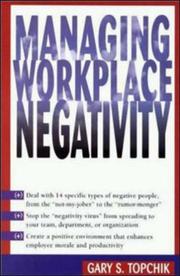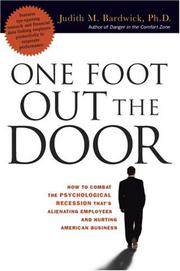| Listing 1 - 10 of 14 | << page >> |
Sort by
|

ISBN: 0470279494 0470428473 9786611382148 1281382140 0470378506 9780470378502 9780470279496 6611382143 9780470428474 9781281382146 Year: 2008 Publisher: Hoboken, N.J. : J. Wiley & Sons,
Abstract | Keywords | Export | Availability | Bookmark
 Loading...
Loading...Choose an application
- Reference Manager
- EndNote
- RefWorks (Direct export to RefWorks)
Negativity in the workplace costs businesses billions of dollars and impacts the morale, productivity and health of individuals and teams. ""In The No Complaining Rule: Positive Ways to Deal with Negativity at Work, Jon Gordon, a bestselling author, consultant and speaker, shares an enlightening story that demonstrates how you can conquer negativity and inspire others to adopt a positive attitude."" Based on one company's successful No Complaining Rule, the powerful principles and actionable plan are practical and easy-to-follow, making this book an ideal read for managers, team leaders
Employee morale. --- Employees - Attitudes. --- Employees -- Attitudes. --- Negativism. --- Work. --- Employee morale --- Employees --- Negativism --- Marketing & Sales --- Commerce --- Business & Economics --- Attitudes --- Attitudes. --- Employee attitudes --- Industrial morale --- Morale, Employee --- Personality --- Psychology, Pathological --- Morale --- Personnel management --- Psychology, Industrial --- E-books

ISBN: 0465006582 Year: 1985 Publisher: New York : Basic Books,
Abstract | Keywords | Export | Availability | Bookmark
 Loading...
Loading...Choose an application
- Reference Manager
- EndNote
- RefWorks (Direct export to RefWorks)
Executives --- Corporations --- Employee morale --- Personnel management --- Chefs d'entreprise --- Entreprises --- Personnel --- Direction --- 650 --- 658.334 --- AA / International- internationaal --- Industrial morale --- Morale, Employee --- Morale --- Psychology, Industrial --- Theorieën en grondbeginselen. Management --- Beroepsvorming en -oriëntatie. Menselijke investeringen. Menselijk kapitaal
Book
ISBN: 3492028977 Year: 1985 Publisher: München
Abstract | Keywords | Export | Availability | Bookmark
 Loading...
Loading...Choose an application
- Reference Manager
- EndNote
- RefWorks (Direct export to RefWorks)
Employee morale --- Employee motivation --- Job satisfaction --- #GROL:MEDO-331.101.3 --- ROLDUC-MEDO --- Motivation in industry --- Work motivation --- Motivation (Psychology) --- Personnel management --- Psychology, Industrial --- Goal setting in personnel management --- Industrial morale --- Morale, Employee --- Morale --- #GROL:SEMI-331 --- Sociology of work

ISBN: 0814425399 0814405827 9780814425398 Year: 2001 Publisher: New York : AMACOM,
Abstract | Keywords | Export | Availability | Bookmark
 Loading...
Loading...Choose an application
- Reference Manager
- EndNote
- RefWorks (Direct export to RefWorks)
"In Managing Workplace Negativity, Topchik explains how to spot this insidious killer of workplace efficiency, as well as how to put negative individuals, teams, and organizations back on the road to recovery." "Topchik illustrates that the outcomes of negativity can be surprisingly tangible, such as increased customer complaints, increased error rates, declining work quality - and particularly damaging in today's tough labor market - increased employee turnover." "But Topchik does much more than point out the problem. He presents a series of practical, easy-to-implement steps for improving your organization's health, as well as inoculating yourself against the infectious pessimism of others." "Managing Workplace Negativity is a tool for constructing positive, productive, and more enjoyable work environments. Even better, it serves as a fresh, new source of optimism for restoring balance and harmony to our professional lives."--Jacket.
Employee morale. --- Employee motivation. --- Supervision of employees. --- Personnel management. --- Commerce --- Business & Economics --- Marketing & Sales --- Corporations --- Employment management --- Human resource management --- Human resources management --- Manpower utilization --- Personnel administration --- Motivation in industry --- Work motivation --- Industrial morale --- Morale, Employee --- Personnel management --- Management --- Public administration --- Employees --- Employment practices liability insurance --- Supervision of employees --- Motivation (Psychology) --- Psychology, Industrial --- Goal setting in personnel management --- Morale

ISBN: 0226878112 0226878120 Year: 2004 Publisher: Chicago (Ill.) University of Chicago Press
Abstract | Keywords | Export | Availability | Bookmark
 Loading...
Loading...Choose an application
- Reference Manager
- EndNote
- RefWorks (Direct export to RefWorks)
When you start a new job, you learn how things are done in the company, and you learn how they are complained about too. 'Unpopular Culture' considers why people complain about their work culture and what impact those complaints have on their organizations. John Weeks based his study on long-term observations of the British Armstrong Bank in the United Kingdom. Not one person at this organization, he found, from the CEO down to the junior clerks, had anything good to say about its corporate culture. And yet, despite all the griping--and despite high-profile efforts at culture change--the way things were done never seemed fundamentally to alter. The organization was restructured, jobs redefined, and processes redesigned, but the complaining remained the same. As Weeks demonstrates, this is because the everyday standards of behavior that regulate complaints curtail their effectiveness. Embarrass someone by complaining in a way that is too public or too pointed, and you will find your social standing diminished. Complain too loudly or too long, and your coworkers might see you as contrary. On the other hand, complain too little and you may be seen as too stiff or just too strange to be trusted. The rituals of complaint, Weeks shows, have powerful social functions.
Business anthropology --- Corporate culture --- Employee morale --- #SBIB:309H251 --- #SBIB:316.334.2A500 --- #SBIB:316.334.2A553 --- #SBIB:39A4 --- Industrial morale --- Morale, Employee --- Morale --- Personnel management --- Psychology, Industrial --- Business --- Corporate anthropology --- Industrial anthropology --- Management anthropology --- Private sector anthropology --- Public sector anthropology --- Anthropology --- Interne communicatie en organisatie --- Organisatiesociologie: algemeen --- Personeelsbeleid en loonbeleid, functieclassificaties --- Toegepaste antropologie --- Anthropological aspects

ISBN: 0761901043 0761901051 1322419655 150631919X 1452231559 1452263205 0585269033 9780585269030 9781452263205 9781452231556 9780761901044 9780761901051 9781506319193 Year: 1997 Publisher: Thousand Oaks (Calif.): Sage,
Abstract | Keywords | Export | Availability | Bookmark
 Loading...
Loading...Choose an application
- Reference Manager
- EndNote
- RefWorks (Direct export to RefWorks)
'Commitment in the Workplace' examines the multiple facets of commitment and the links between the various forms of commitment and organizational behaviour.
Employee morale --- Employee motivation --- Organizational behavior --- Work ethic --- Personnel --- Comportement organisationnel --- Ethique du travail --- Moral --- Motivation --- #SBIB:316.334.2A553 --- #SBIB:AANKOOP --- Personeelsbeleid en loonbeleid, functieclassificaties --- Employee morale. --- Employee motivation. --- Organizational behavior. --- Work ethic. --- Arbeids- en organisatiepsychologie --- menselijke betrekkingen --- Personnel management. --- Marketing & Sales --- Commerce --- Business & Economics --- menselijke betrekkingen. --- Behavior in organizations --- Ethic, Work --- Industrial morale --- Morale, Employee --- Motivation in industry --- Work motivation --- Management --- Organization --- Psychology, Industrial --- Social psychology --- Ethics --- Morale --- Personnel management --- Motivation (Psychology) --- Goal setting in personnel management --- Menselijke betrekkingen.
Book
ISBN: 143024965X 1430249668 Year: 2013 Publisher: Berkeley, CA : Apress : Imprint: Apress,
Abstract | Keywords | Export | Availability | Bookmark
 Loading...
Loading...Choose an application
- Reference Manager
- EndNote
- RefWorks (Direct export to RefWorks)
Given the opportunity to describe Apple as a company in just a word or two, most would respond with adjectives like: Innovative. Design-conscious. Iconic. Some would probably even say: Secretive. But here's another: Soulful. Yes, Apple has a soul, and it is not alone in that respect. A select few organizations can similarly be said to exhibit similar qualities of soul that inspire passion in their employees and set them on the path to high levels of sustained organizational performance. But, given that most organizations are plagued by low levels of employee engagement and lackluster organizational performance, how do high-performing organizations do it? How do they ignite and sustain employee engagement and boost individual and overall organizational productivity? That is exactly the question that organizational expert David B. Zenoff sets out to answer in The Soul of the Organization. Based on the author's extensive experience consulting to and observing some of the best-known organizations in the world, The Soul of the Organization (www.souloftheorganization.com) journeys into eleven high-performing organizations operating in both the for-profit and not-for-profit worlds to determine the underlying elements of soul that foster strong employee engagement at all levels. What Zenoff finds in his inquiry is that organizations as different as home goods retailer Williams-Sonoma and not-for-profit group Larkin Street Youth Services all share in common five key elements of soul that, taken together, are powerful forces for fostering employee engagement, satisfaction, and meaning. And he doesn't stop once he has identified the five core elements of an organization's soul. Instead, he goes on to offer both a conceptual framework and a practical primer on how to leverage these key ingredients to create, sustain, and nourish a soul in your organization. Organizations of all stripes and in all industries and domains have great difficulty motivating their workforces to demonstrate a strong commitment to giving their all in the workplace. As a result, these organizations' overall productivity and growth are compromised, and their employees cannot find meaning or satisfaction in their work. If your organization struggles with sub-par employee loyalty, commitment, and drive, you will find the guidance you need in The Soul of the Organization, a guide to infusing into your workplace that "special something" that engages employees, drives their productivity, and taps into their collective well of potential so that your organization can make its mark on the world. .
Corporate culture. --- Economics. --- Employee morale. --- Labor productivity. --- Personnel management. --- Employee motivation. --- Labor output --- Productivity of labor --- Motivation in industry --- Work motivation --- Industrial morale --- Morale, Employee --- Business. --- Management science. --- Business and Management. --- Business and Management, general. --- Trade --- Economics --- Management --- Commerce --- Industrial management --- Quantitative business analysis --- Problem solving --- Operations research --- Statistical decision --- Industrial productivity --- Capital productivity --- Hours of labor --- Labor time --- Productivity bargaining --- Motivation (Psychology) --- Personnel management --- Psychology, Industrial --- Goal setting in personnel management --- Morale

ISBN: 0131423304 Year: 2005 Publisher: Upper Saddle River Wharton School
Abstract | Keywords | Export | Availability | Bookmark
 Loading...
Loading...Choose an application
- Reference Manager
- EndNote
- RefWorks (Direct export to RefWorks)
Employee morale. --- Employee motivation. --- Job satisfaction. --- Success in business. --- Employee morale --- Employee motivation --- Job satisfaction --- Success in business --- 658.315 --- Business --- Business failures --- Creative ability in business --- Prediction of occupational success --- Occupational satisfaction --- Work satisfaction --- Quality of work life --- Satisfaction --- Job enrichment --- Motivation in industry --- Work motivation --- Motivation (Psychology) --- Personnel management --- Psychology, Industrial --- Goal setting in personnel management --- Industrial morale --- Morale, Employee --- Morale --- 658.315 Relations between management and workforce within the firm --- Relations between management and workforce within the firm

ISBN: 128112818X 9786611128180 0814409504 9780814409503 9780814480588 0814480586 9781281128188 6611128182 Year: 2008 Publisher: New York : AMACOM/ American Management Association,
Abstract | Keywords | Export | Availability | Bookmark
 Loading...
Loading...Choose an application
- Reference Manager
- EndNote
- RefWorks (Direct export to RefWorks)
As many as two-thirds of our employees are either actively looking for new jobs or merely going through the motions at their current jobs. Fearful and feeling vulnerable after years of watching friends get laid off, they expect the worst to happen, and they see no reason to give it their all. This phenomenon, identified by renowned author Judith M. Bardwick as "the psychological recession," can have a devastating effect on a company’s financial health. Based on extensive research showing how costly bad management really is, this eye-opening book offers concrete prescriptions for combating alarming trends such as high turnover, low productivity, and lackluster performance, including techniques for: * strengthening the bonds of trust and respect between managers and employees * customizing working conditions and rewards for individual employees * hiring for the "best fit" between the organization’s core culture and the personal qualities and priorities of the individual Using hard numbers and current studies that prove the direct connection between a company’s financial performance and its employees’ commitment, this book is a wake-up call to organizations desperately needing to restore the broken spirits at the heart of their companies, and enhance their bottom lines.
Psychology, Industrial --- Employees --- Employee morale --- Management --- Quality of work life --- Commerce --- Business & Economics --- Marketing & Sales --- Humanization of work life --- Quality of working life --- Work life, Quality of --- Working life, Quality of --- Quality of life --- Work --- Industrial morale --- Morale, Employee --- Morale --- Personnel management --- Laborers --- Personnel --- Workers --- Persons --- Industrial relations --- Business psychology --- Industrial psychology --- Psychotechnics --- Industrial engineering --- Psychology, Applied --- Industrial psychologists --- Attitudes. --- Psychological aspects. --- Attitudes --- Psychological aspects
Book
ISBN: 9026707304 Year: 1981 Publisher: Deventer : Kluwer,
Abstract | Keywords | Export | Availability | Bookmark
 Loading...
Loading...Choose an application
- Reference Manager
- EndNote
- RefWorks (Direct export to RefWorks)
Business policy --- Labour conflicts --- Netherlands --- Employee morale --- -#SBIB:316.334.2A500 --- Arbeidsorganisatie 331.103 --- Industrial morale --- Morale, Employee --- Labor output --- Productivity of labor --- Employee morale. --- Labor productivity --- Organizational change --- Organizational effectiveness --- Work environment --- management --- nederland --- productie --- #SBIB:316.334.2A500 --- #SBIB:HIVA --- Morale --- Personnel management --- Psychology, Industrial --- Industrial productivity --- Capital productivity --- Hours of labor --- Labor time --- Productivity bargaining --- Climate, Workplace --- Environment, Work --- Places of work --- Work places --- Working conditions, Physical --- Working environment --- Workplace --- Workplace climate --- Workplace environment --- Worksite environment --- Environmental engineering --- Industrial engineering --- Change, Organizational --- Organization development --- Organizational development --- Organizational innovation --- Management --- Organization --- Manpower planning --- Case studies --- pays bas --- production --- Organisatiesociologie: algemeen --- Labor productivity. --- Organizational change. --- Organizational effectiveness. --- Work environment. --- Case studies.
| Listing 1 - 10 of 14 | << page >> |
Sort by
|

 Search
Search Feedback
Feedback About UniCat
About UniCat  Help
Help News
News